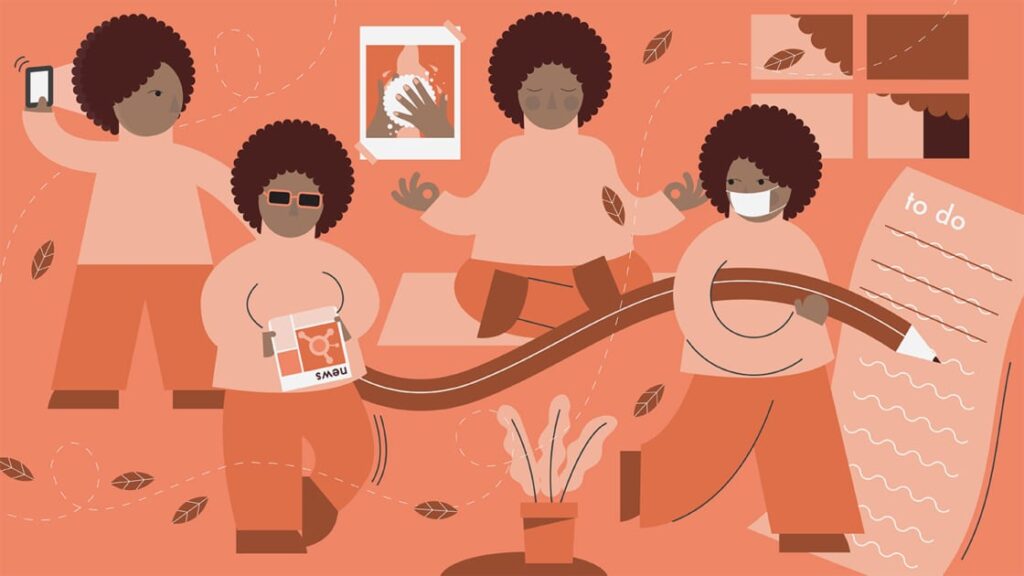Our advice columnist outlines the best way to cope while working from home in these trying times
As the space between work and not-work becomes ever more blurred, questions about how to do this thing we plug away at for 30 or 40 or 70 hours a week become all the more expansive. In Work Flow, we delve into the novel dilemmas created by the new ways we work, as well as timeless questions about ethics, gender assumptions, and toxic work situations (and how to escape them). How we work is an important component of how we live—and we’re here to help you do better at both.
Something messing with your flow? Unload your work problems here, and you’ll not only feel heard but you’ll also get unbiased, real-world advice. (That’s something your work sibling/spouse just can’t offer.)
Like most reasonable people, I am freaking out about the coronavirus. My “coping method” consists of reading the news and “refreshing” to see what’s happening next. I also read Twitter. It’s not really calming me down, but I can’t seem to stop. Meanwhile, I’m working from home while self-isolating, and I have a job to do, which I’m scared I could easily lose if I don’t focus. This just makes matters worse (and sends me right back to reading about the pandemic). Help! How do I get any work done when I’m panicking about world news?
It’s impossible to focus when you’re shouting “Focus! Just focus! Why can’t you focus?!” at yourself during a pandemic, when there are messages coming at you from all directions, and most of them aren’t particularly soothing or positive. I don’t know if it helps at all to say you’re not alone in this, but you’re very much not alone in this. We are all in this together, and that’s become patently clear.
Look, working alone in our homes (or with other people, and/or while having to manage children) can challenge our focus in the best of circumstances, even for those who have been doing it for quite a long time. I struggled to focus long before this new coronavirus. Throw in suddenly working from home, without a lot of time for preparation or much independent choice on your part (and perhaps lacking many of the resources you need to do your job properly), a virus outbreak that threatens each and every one of us, and a healthcare system that’s ill-prepared to deal with it, and you have every right to freak out! To be very clear…
1) You’re not at all in the wrong, here. This is not some sort of problem you have created for yourself, or one for which you are at fault; your feelings are valid, as well as the emotions that many people are feeling right now (not that we all have to engage with one another’s feelings, which can ratchet up the panic).
And 2) since even our own managers and bosses and heads of corporations are having these feelings, one would hope that human empathy would mean granting a little bit of flexibility and leeway for everyone in this transition period as we self-isolate for an unknown period of time and hope for the best outcome.
OK, so what should you do to get through this moment, which may end up being a very long moment? How exactly do you focus when you’re panicking about world news? The answer is, it’s hard. You can’t focus and panic at the same time. But you can try to quell the panic a little bit, which should ramp up your ability to focus, by doing this:
Step 1. Limit your news consumption
None of us needs to be reading the news, then refreshing, reading the news, then refreshing. Even on days before the pandemic, that kind of behavior could send you into a spiral. One anecdote I heard from someone who was in China during the height of the coronavirus crisis there was about how they limited their news consumption to 10 minutes, twice a day. Those two news breaks told them all they needed to know.
While things are moving fast, a morning and evening news check-in should keep you apprised but also give you space to think about and process other things too (and to get some of your actual work done). You can alternatively subscribe to email digests, like The Skimm, which cull down the news you really need to know into one missive per day, or even take turns in a friends group on reporting only what’s urgent, once a day. (Make sure to get clear on what “urgent” means before you do this, and then determine who’s taking on the duty each day.)
Step 2. Create a to-do list
A to-do list is one of the most simple yet calming things you can use to guide you in these trying times. In the morning, or even the night before, write down the tasks you need to accomplish for the day, not just for work but in your life, especially as work and life blend together while you’re working from home. Personally, I like to divide these into different sections but keep them all on one page and laid out clearly so I can see it all in one place. Experiment to see what works best for you. Add items to your list as you need to throughout the day, and include anything that distracts you but may be something you really need to do (like buy more milk). I guarantee it will soothe you, at least a little, and make you feel awesomely productive when you cross things off your list.
Get the latest Ideas by WeWork delivered to your inbox
Step 3. Set a timer while working to minimize distractions
I reached out to Dr. David Austern, clinical assistant professor of psychiatry at NYU Langone Health, who noted that tools often used for reducing distractibility in people with executive functioning deficit can be helpful for all of us right now. He suggested setting a time goal for how long you’ll work on a task before giving yourself a break: Try 45 minutes, which is roughly what most people can do before they should take a break (if you can do longer, go you!).
“Set a timer, sit down, and try to work,” he says. He also recommends that you keep a piece of paper or a Word document open nearby, so whenever you feel the urge to stop working on your task—and, say, check the news—you write that urge down. “Don’t give in and shift back to the task,” he says. When your timer goes off, you can look at your list, and if anything is important enough to turn into a new task, move that over to your to-do list. When you get to your break, if you really need to, you can do that thing…but more likely, Dr. Austern says, the urge will pass. This is a skill you can build: You’re strengthening your attentional muscle by delaying what threatens to take your attention off the task at hand. And, ideally, you’re getting work done.
Step 4. Take breaks that really clear your head
This may mean getting away from the screen—Twitter during the middle of the day is far too risky and threatens to pull you into that panic spiral. Do something, “ideally physical,” says Dr. Austern. Get a snack, take a walk, meditate, move around, do 25 jumping jacks, pop outside. Make sure your break isn’t too long—15 minutes seems to be the standard rule of thumb, with a bit longer period for lunch.
But, you know, if you’re working from home and what really helps you is an hourlong walk at 3 p.m., go for it (as long as it’s cool with the people you work for to be away for that time period). Pay attention to what methods give you space to breathe and set you up for greater focus afterward.
Step 5. Disable your internet
Even those of us who work remotely don’t need to be literally connected 24-7. If you find yourself pulled back again and again, reduce your internet access temporarily, whether by using blocker apps or doing it the old-fashioned way: by turning off your WiFi. Similarly, “if you don’t need your phone, turn it off and put it in a cabinet on the top shelf behind eight boxes!” says Dr. Austern.
If you find yourself flipping on CNN, work in a room where there is no TV, or cover it up with a blanket. This is called harm reduction. Making it hard to get to a risky thing reduces the likelihood that you’ll engage with it, he explains. If it’s part of your job to use the internet, separate those tasks from the tasks that can be done off-line, and do them in blocks to avoid temptation. (And if the distraction comes from sharing space with a roommate or family member, do your best to establish specific hours for when you’re working and not to be disturbed and for when you’re off the clock. Also, if you can, pick up a pair of noise-canceling headphones.)
Making your work “intentional” will help you feel more in control of your behavior, which may also help combat some of the panic and spiraling. “With everything going on right now, the predominant emotion is feeling very helpless!” says Dr. Austern. If you can find some control in doing your work mindfully and deliberately, that can help.
And because this panic extends from work into life, also seek support socially. When you’re not in work mode, reach out to friends through phone calls and video chats. If you feel you need more support (who among us doesn’t?), consider seeking out a therapist, many of whom are shifting to virtual work right now. Hang in there.


Hi, this is a comment.
To get started with moderating, editing, and deleting comments, please visit the Comments screen in the dashboard.
Commenter avatars come from Gravatar.